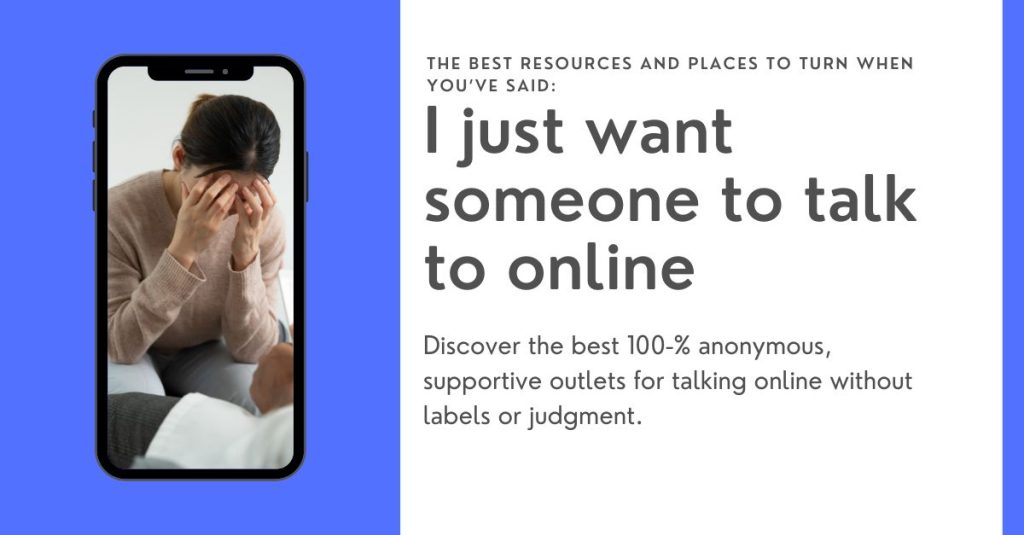
Feeling isolated and overwhelmed by difficult emotions often leads to the search “i just want to talk to someone,” which highlights a universal need for connection and understanding. Online therapy, counseling, peer support chats, and crisis services provide accessible emotional relief by connecting you with trained professionals and compassionate listeners via digital channels. In this guide, you will discover what online therapy entails, the mental health conditions it addresses, how to select the right virtual platform, the research supporting its effectiveness, and practical steps to begin your journey today. We will also explore emerging trends—such as AI integration and hybrid care models—that shape the future of talking to someone online.
Online therapy is a digital mental health service delivered by licensed therapists through secure video, audio, or messaging platforms. It combines evidence-based approaches, such as Cognitive Behavioral Therapy, with real-time emotional support to improve coping skills and psychological resilience. By leveraging telehealth infrastructure, online therapy enhances accessibility for individuals facing geographic, scheduling, or mobility barriers. This format provides consistent therapeutic relationships that foster trust, reduce stigma, and promote mental well-being even when in-person sessions are impractical.
Licensed providers tailor treatment plans to individual needs and use interactive tools—such as worksheets, screen sharing, and real-time feedback—to reinforce learning between sessions. These techniques support symptom reduction and skill development by adapting traditional psychotherapy methods to a virtual environment. Understanding the mechanisms of online therapy paves the way to selecting the right modality and communication style for your emotional support needs.

Online therapy with licensed therapists begins by completing a confidential intake assessment that identifies your mental health concerns and treatment goals. Providers use secure telehealth platforms to schedule structured sessions, during which they apply specialized interventions like cognitive restructuring and behavior activation. This process promotes emotional insight and skill acquisition by guiding you through tailored exercises, establishing a collaborative therapeutic alliance, and monitoring progress through follow-up assessments..
Therapy modalities offered virtually mirror traditional in-person services but often include additional digital tools that enhance engagement and accessibility. Common online therapy types include:
Each modality employs structured sessions to target specific mental health concerns, ensuring that virtual formats maintain the rigor and effectiveness of established therapeutic procedures.
Online therapy’s range of modalities and digital enhancements demonstrates its capacity to meet diverse emotional support needs while preserving the integrity of evidence-based practice.
Online counseling often emphasizes guidance for life transitions, stress management, and situational challenges, whereas online therapy focuses on clinically validated interventions for diagnosable mental health conditions. Counselors may provide coaching, motivational support, and coping strategies without diagnosing or treating psychiatric disorders. This distinction guides individuals toward the appropriate service: counseling for personal development and therapy for deeper emotional or behavioral change.
While both formats foster emotional support, online therapy typically involves ongoing treatment plans, symptom tracking, and measurable outcomes, whereas counseling offers flexible, goal-oriented sessions that adapt to immediate challenges.
Other formats, like online support calls provided by Someone Listens, offer an effective medium between those that don’t include enormous copays and deductibles or the need for diagnostics. They just offer simple, friendly conversation when you need to vent.

Emotional support chats and peer support communities connect individuals with trained volunteer listeners or peers who share lived experience. These services provide anonymous, empathetic listening and practical encouragement through text or voice chat. Participants benefit from real-time solidarity and understanding in a judgment-free environment, which can alleviate feelings of loneliness and distress.
Common features of emotional support platforms include moderated forums, group chats, and one-on-one peer matches that promote ongoing connection and community resilience.
Before engaging in crisis services, individuals often require immediate, professional intervention to ensure safety and stabilization. Below is a comparison of popular online crisis support services:
| SERVICES | RESPONSE TIME | SUPPORT TYPE |
|---|---|---|
| Crisis Text Line | Under 1 Minute | Trained Volunteer Chat |
| 7 Cups | Within 5 Minutes | Peer Listener Messaging |
| Online Hotline | Immediate | Licensed Counselor Via Voice |
Each service employs trained responders who provide active listening, safety planning, and referrals to emergency services when necessary. Recognizing the availability and responsiveness of these crisis options can be life-saving and reinforces the importance of accessible, immediate emotional support.
Online mental health services treat a wide spectrum of conditions, from common mood disorders to life-stress challenges, by delivering targeted interventions and support across digital platforms. Evidence shows that virtual therapy effectively addresses both acute and chronic issues through structured sessions, digital homework assignments, and progress monitoring. The flexibility of online formats allows individuals to access care for diverse concerns—such as anxiety, depression, stress, and trauma—without compromising treatment quality or therapeutic alliance.
By understanding which conditions benefit from online intervention, you can make informed decisions about seeking digital support and discuss personalized treatment options with your provider.
Online therapy reduces anxiety and depression symptoms by teaching cognitive and behavioral techniques that interrupt maladaptive thought patterns and promote positive coping skills. Therapists guide clients through exposure exercises, mood tracking, and relaxation practices via secure video sessions, improving symptom management and fostering emotional regulation across daily activities.

Virtual counseling offers structured stress-management tools—such as mindfulness exercises, self-compassion practices, and workload prioritization—to alleviate burnout and prevent emotional exhaustion. In grief counseling, licensed clinicians facilitate the mourning process through narrative techniques, support networks, and remembrance rituals adapted to digital formats, ensuring compassionate care during vulnerable periods.
Online platforms extend specialized interventions to address relationship conflicts and trauma recovery through modalities like:
These options integrate secure telehealth technology with evidence-based protocols to deliver targeted support for relational and trauma-related concerns.
Selecting the ideal virtual mental health platform involves evaluating credentials, costs, communication methods, and privacy safeguards. Prioritize licensed providers who specialize in your specific concerns and use platforms that integrate secure encryption standards. Consider features such as therapist matching algorithms, session flexibility, and available modalities to ensure alignment with your preferences and needs. Assessing these factors upfront enhances therapeutic satisfaction and long-term engagement.
Choosing wisely establishes a foundation for successful virtual support that addresses both your emotional well-being and practical circumstances.
Seek providers who hold valid professional credentials, specialized training in your area of concern, and accreditation from recognized mental health organizations. Verify that therapists maintain active licenses in your jurisdiction and offer clear treatment plans with measurable goals. This scrutiny ensures you receive competent, evidence-based care aligned with industry standards and ethical guidelines.
Cost structures for virtual mental health services vary widely, affecting accessibility and planning.
| PAYMENT OPTION | COST RANGE | CONSIDERATION |
|---|---|---|
| Insurance-Covered Plan | 0-$50 per session | Co-pay or deductible may apply |
| Subscription services | $60-$90 weekly | Unlimited messaging and discounted calls |
| Pay-per-session | $80-$200 per session | Up-front payment required |
| Sliding-scale therapy | $30-$100 per session | Fees based on income eligibility |
| Someone Listens | $20 per session/$59 monthly subscription (4 30 min. calls, unlimited messsaging) | Same cost for everyone, no copay or deductible |
Comparing these options helps you balance quality of care with budgetary constraints, ensuring sustainable access to support.
Different modalities offer unique advantages for emotional support. Video sessions enable face-to-face interaction and nonverbal cues, which strengthen rapport and enhance treatment fidelity. Live chat provides convenience and immediacy for brief check-ins or coping skill reinforcement. Asynchronous messaging allows flexibility to reflect and respond thoughtfully, supporting individuals with unpredictable schedules or social anxiety.
Assess whether platforms use end-to-end encryption, HIPAA-compliant servers, and multi-factor authentication to protect your data. Review privacy policies for details on data storage, sharing practices, and legal obligations. Confirm that providers adhere to confidentiality regulations and uphold ethical standards in digital record-keeping. Ensuring robust security measures cultivates trust and safeguards your personal information.
Yes, numerous studies confirm that online therapy matches in-person counseling in reducing symptoms of anxiety, depression, and PTSD. A meta-analysis of digital psychotherapy research demonstrates comparable effect sizes, attributing success to the standardized delivery of evidence-based interventions across virtual platforms. Online formats also enhance continuity of care by eliminating travel barriers and allowing more frequent check-ins, which support ongoing progress.
Online CBT treats these conditions by guiding individuals through cognitive restructuring exercises to challenge unhelpful beliefs, exposure tasks to reduce avoidance, and behavioral activation techniques that increase engagement in rewarding activities. Therapists monitor progress via digital worksheets and provide real-time feedback, ensuring that the core mechanisms of CBT translate effectively to the virtual environment.

Virtual counseling offers several key benefits:
These advantages enhance treatment adherence and broaden access to quality mental health care.
Online therapy supports sustained recovery by integrating follow-up sessions, booster modules, and digital self-help tools that reinforce coping strategies over time. Regular check-ins and progress tracking features help maintain accountability, while app-based reminders encourage skill practice between sessions, fostering enduring behavioral change.

Taking the first steps toward virtual emotional support begins with identifying your primary concerns and matching them to suitable services. Start by researching platforms that match your needs, complete intake assessments, and schedule an initial consultation. Preparing a list of goals and questions enhances session productivity, while ensuring a stable internet connection and private setting supports confidentiality. Establishing this foundation promotes a seamless introduction to online therapy or counseling.
Begin by browsing reputable platforms that feature licensed professionals and clear service descriptions. Complete preliminary questionnaires to clarify your goals, preferences, and availability. Once matched, review therapist profiles to ensure alignment in specialization, communication style, and cultural competence before confirming your first session.
Create a private, quiet space with reliable internet and minimal distractions. Test audio and video settings in advance and gather any relevant documents or symptom journals. Arriving five minutes early establishes technical readiness and mental calm, allowing you to focus fully on the therapeutic process.
Several no-cost or low-cost resources offer immediate emotional relief:
These options deliver essential support while you arrange ongoing therapy with licensed professionals.
Set consistent session schedules and establish small, achievable goals to track improvements. Use built-in platform features—like mood trackers and homework reminders—to reinforce new skills. Engage in supplemental activities, such as journaling or mindfulness exercises, to deepen treatment gains between sessions and sustain momentum.
The virtual mental health landscape continues to evolve with technological advancements and regulatory updates that enhance quality and accessibility. Artificial intelligence is being integrated into assessment tools, chatbots, and personalized treatment pathways, augmenting human-led therapy and providing immediate self-help resources. Hybrid care models combine in-person and online sessions to optimize flexibility and therapeutic continuity. Mobile apps drive widespread adoption through on-the-go access, while policy changes in 2025 expand insurance coverage and telehealth regulations. These innovations signal a future where mental health support is more proactive, personalized, and universally attainable.
Staying informed about these trends allows you to leverage emerging technologies and policy developments for more effective and convenient emotional support.
AI algorithms now analyze assessment responses to recommend tailored therapeutic pathways and prompt personalized self-help exercises. Chatbots deliver psychoeducational content and coping strategies between sessions, enhancing engagement and providing 24/7 assistance for low-level distress.
Hybrid models blend face-to-face sessions with virtual check-ins, enabling clinicians to offer flexible care that adapts to client needs. This approach maintains the rapport of in-person meetings while leveraging the convenience of remote follow-ups, optimizing clinical outcomes and resource utilization.
Mobile apps extend therapy tools—such as mood trackers, journaling features, and on-demand coping exercises—directly to smartphones, making mental health resources accessible anytime, anywhere. Push notifications promote skill practice and session reminders, increasing treatment adherence and self-management between appointments.
Recent policy updates have expanded insurance reimbursement for tele-mental health, removed geographic restrictions, and mandated parity between virtual and in-person services. These changes enhance affordability and ensure wider coverage for online therapy, encouraging more providers to adopt digital care models.
Thinking through these developments positions you to take full advantage of advancing telehealth infrastructure and regulatory support as you seek virtual emotional assistance.
If you’re looking for a powerful alternative to the strict compliance, insurance, and scheduling issues of online treatment and therapy, contact Someone Listens today for a friendly support call with an empathetic listener who cares about your wellbeing.
During your first online therapy session, you can expect to discuss your reasons for seeking help, your mental health history, and any specific goals you have in mind. The therapist will likely conduct an intake assessment to better understand your needs. This session is also an opportunity for you to ask questions about the therapist’s approach and the therapy process. Establishing a comfortable environment is key, so be prepared to share openly while also assessing if the therapist is a good fit for you. At Someone Listens, we don’t dive into complicated treatment plans or labeled diagnostics. In fact, you lead the conversation, talk about whatever you want, whenever you want.
To ensure confidentiality during online therapy sessions, choose platforms that comply with HIPAA regulations and use end-to-end encryption. Before starting, review the therapist’s privacy policy to understand how your data will be stored and used. Additionally, conduct sessions in a private space where you won’t be overheard, and avoid using public Wi-Fi networks. Discuss any concerns about confidentiality with your therapist to ensure you feel secure in sharing personal information. At Someone Listens, we have our own privacy policy that covers all of our clients against disclosing any contents of their support calls to the public, advertisers, or other third-parties.
Several reputable online platforms are recommended for therapy, including BetterHelp, Talkspace, and 7 Cups. These platforms offer a range of services, from text-based support to video sessions with licensed therapists. When choosing a platform, consider factors such as the types of therapy offered, therapist credentials, user reviews, and pricing structures. It’s essential to select a platform that aligns with your specific needs and preferences for the best therapeutic experience. At Someone Listens, we offer a support call service that allows you to vent without the extra baggage. No copays, no insurance red tape…just a friendly conversation with an empathetic ear.
Signs that any service is working, whether it’s an online counselor or the services provided by Someone Listens, include decreased anxiety, lowered stress levels, lowered levels of paranoia, willingness to talk to people or participate in public events, and a general feeling of a large weight lifted from your shoulders.
